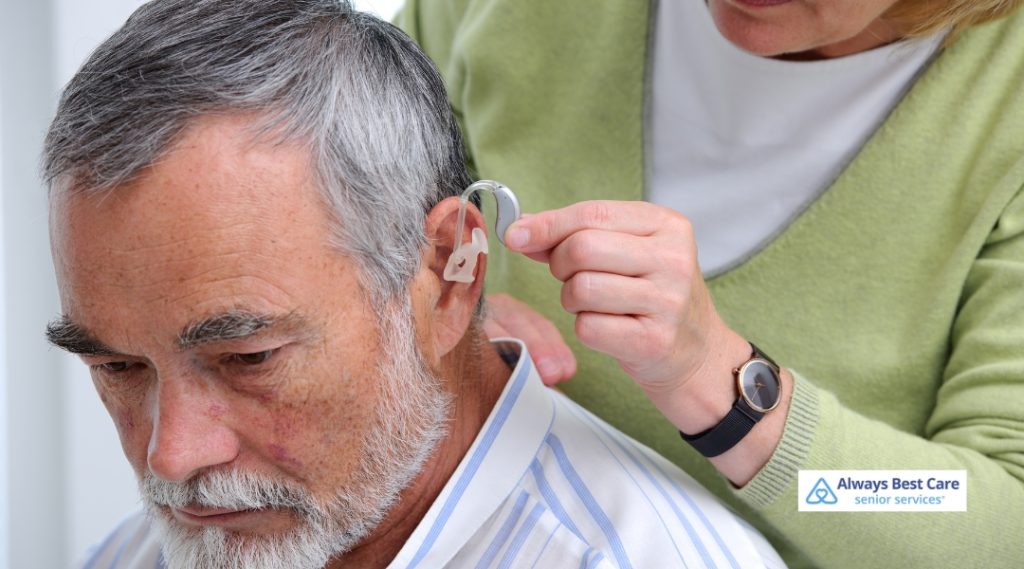What to Say When You Notice a Loved One Isn’t Hearing Well

Hearing loss often sneaks up on us, often disguised as just another sign of aging.
But for our seniors, even a slight dip in hearing can lead to missed conversations and feelings of isolation.
Spotting those early signs is important, yet starting “the talk” about hearing health is?
Whew, it’s rarely easy.
At Always Best Care of West Monroe, we know this conversation tugs at the heartstrings and requires real sensitivity.
So, let’s roll up our sleeves and dive into how we can open this door gently and supportively.
What you will learn:
- How to recognize early signs of hearing loss in your loved one and know when it’s time to speak up.
- Thoughtful ways to approach the conversation with empathy, patience, and respect.
- How to gently break down fears around hearing aids and reinforce confidence and independence.
- The supportive role Always Best Care of West Monroe plays in helping seniors stay connected, safe, and heard every day.
Table of Contents
Recognizing the Signs of Hearing Loss
It isn’t always loud or obvious when someone starts losing their hearing; sometimes, the changes are downright sneaky!
Here are a few telltale signs:
- Struggling to keep up with group chats or phone calls.
- Frequently asking folks to repeat themselves (or play “telephone” a few times).
- Pumping up the TV volume way past comfortable levels.
- Grumbling that everyone suddenly mumbles.
- Quietly bowing out of social gatherings or appearing disengaged.
- Giving off-the-wall responses due to mishearing.
Sound familiar? If so, it might be time for us at Always Best Care of West Monroe to step in with some friendly guidance.

How Do You Gently Bring Up Hearing Loss?
Okay, here comes the tricky part: finding your moment. Timing is everything! Don’t bring it up during an argument or while voices are raised over a blaring TV set. Instead:
Choose Calm Over Chaos
Find a peaceful time when you won’t be interrupted by ringing phones or barking dogs.
Lead with Empathy
Kick off with statements like:
- “I’ve noticed you’re turning the TV louder lately; is that bothering you?”
- “Sometimes, I worry you’re missing out on what everyone’s saying, have you noticed that too?”
Avoid Finger Pointing
Swap accusations (“You never listen!”) for concern (“I want us all to stay connected.”). This takes away any sting from what could otherwise feel like criticism.
Remind Them They’re Not Alone
Let them know plenty of people wear glasses; needing help with hearing isn’t any different!
Tackling Stigma & Fear Around Hearing Loss
Let’s face it: nobody wants their independence called into question. Many seniors dread what they think admitting to hearing trouble might mean for their freedom. Some worry about being seen as weak; others cringe at wearing visible aids.
But guess what? Today’s devices are sleeker than ever, and keeping those lines open does wonders for self-confidence! Help take down those walls by sharing truths like these:
- Hearing loss doesn’t mean failure, just biology doing its thing.
- Getting checked helps maintain independence longer.
- Modern devices blend right in, no need for clunky hardware anymore!
At Always Best Care of West Monroe, we go out of our way to make these transitions feel natural, not scary.

Encouraging Action Without Pushing Too Hard
So they seem open, but not quite ready? No problem! Try offering gentle support such as:
- Suggest scheduling an appointment together.
- Offer rides (and maybe grab coffee after).
- Be patient if they aren’t immediately on board.
- Remind them that checking their ears doesn’t mean losing control; it means gaining clarity!
If needed, circle back later, but don’t rush things.
How We at Always Best Care Support Seniors’ Hearing Health
Here at Always Best Care of West Monroe, caring goes beyond checklists. Our caregivers:
- Bridge communication gaps so nothing gets lost in translation.
- Watch out for safety risks linked with missed sounds (like timers buzzing or alarms).
- Nudge gently about upcoming appointments without nagging.
- Encourage using prescribed devices consistently.
- Provide companionship, because feeling heard matters as much emotionally as physically.
We pride ourselves on keeping families looped in while treating each senior like family themselves.

FAQ About Talking to Your Loved One About Hearing Loss
Q: What if my loved one gets defensive when I mention their hearing?
A: Stay calm and compassionate; remind them everyone needs help sometimes, it’s not personal!
Q: How do I convince them that seeing an audiologist isn’t scary?
A: Reassure them it’s just another health checkup, no big deal, and offer moral support along every step.
Q: Can caregivers really make a difference if my loved one struggles socially because they can’t hear well anymore?
A: Absolutely, we bridge conversations gently, provide reminders unobtrusively, and encourage inclusion every day.
Reconnect with Care and Confidence!
Worried that a loved one might be missing out due to hearing loss? A gentle conversation can open the door to better communication and brighter days. At Always Best Care of West Monroe, we’re here to support your family with compassion, practical help, and personalized care.
Contact Always Best Care of West Monroe at (318) 322-2223 to learn more and schedule your free consultation.





